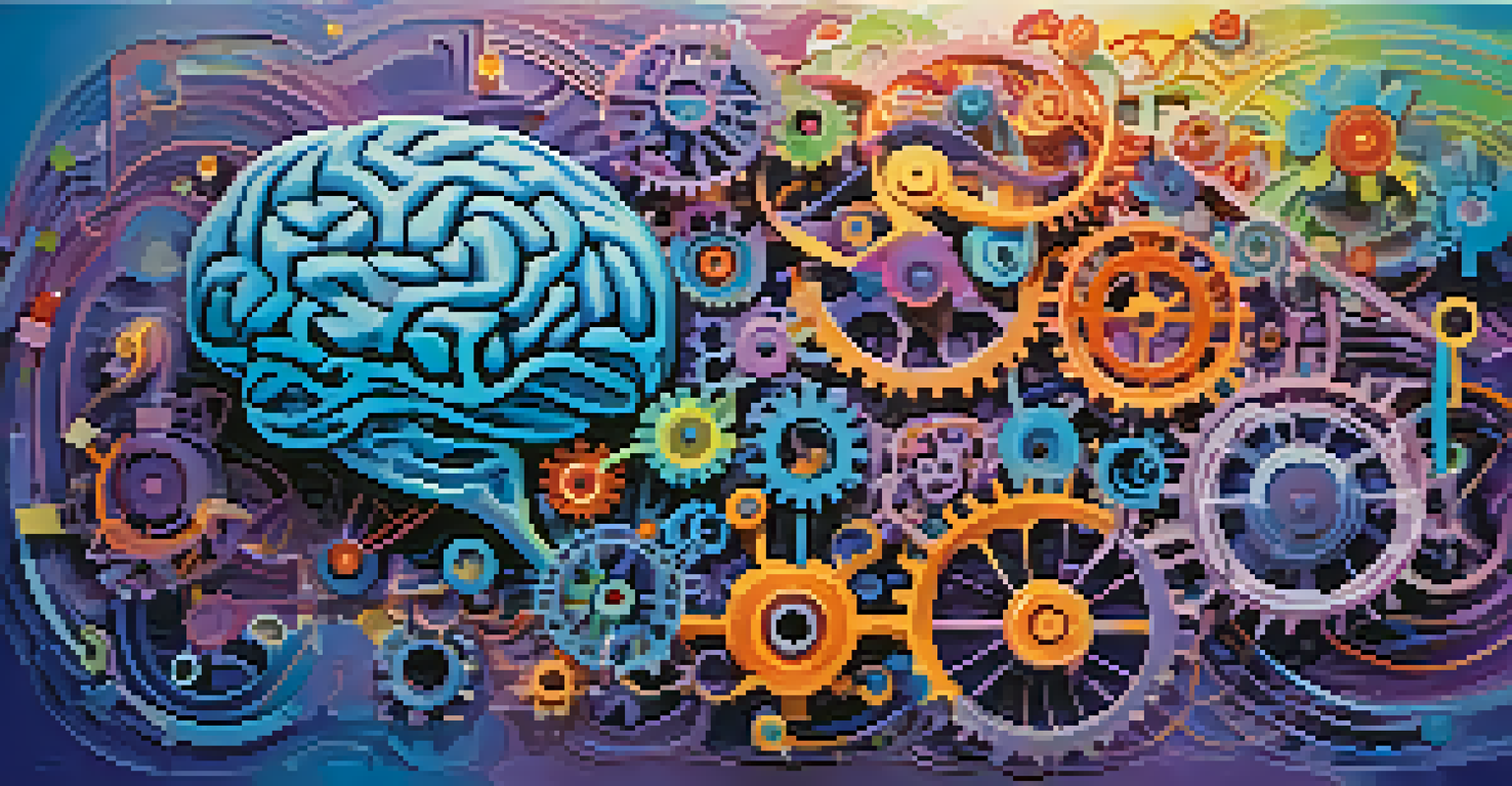Hallucinogens: A Catalyst for Cognitive Restructuring in Problem-Solving

Understanding Hallucinogens and Their Effects
Hallucinogens are substances that alter perception, mood, and various cognitive processes. Common examples include LSD, psilocybin, and mescaline. These substances can induce experiences that may seem surreal or even mystical, leading users to perceive reality in fundamentally different ways.
The mind is everything. What you think you become.
The effects of hallucinogens can lead to changes in thought patterns, allowing individuals to break free from conventional ways of thinking. This shift can open up new avenues for creativity and problem-solving. By altering the typical pathways our brains follow, these substances can provide unique perspectives on challenges.
It's important to note that while some people report positive experiences, hallucinogens can also lead to negative effects or 'bad trips.' Therefore, understanding the context in which they are used is crucial for harnessing their potential.
Cognitive Restructuring Explained
Cognitive restructuring is a psychological technique that helps individuals change negative thought patterns and beliefs. By reframing how we think about problems, we can approach them with a fresh mindset. This technique is often used in therapy to assist people in overcoming anxiety and depression.

At its core, cognitive restructuring encourages flexibility in thinking, which is essential for effective problem-solving. When faced with obstacles, those who can adapt their thought processes are more likely to find innovative solutions. This adaptability is a key component of creativity.
Hallucinogens Alter Perception
Hallucinogens like LSD and psilocybin can significantly change how individuals perceive reality, potentially leading to unique insights.
By integrating hallucinogens into this process, some researchers believe it might enhance the ability to restructure cognitive patterns even further. This interplay suggests that these substances could act as catalysts in the cognitive restructuring process.
The Role of Creativity in Problem-Solving
Creativity plays a vital role in how we solve problems, allowing us to think outside the box. When confronted with a challenge, creative thinking helps generate multiple solutions rather than settling for the first answer that comes to mind. This broad approach can lead to more effective and innovative outcomes.
Creativity is intelligence having fun.
Hallucinogens can potentially stimulate creative thought processes, as they often encourage divergent thinking. Divergent thinking is the ability to generate multiple ideas or possibilities in response to a single prompt. This can be particularly beneficial in situations requiring complex problem-solving.
By enhancing creativity, hallucinogens may help individuals discover unique solutions to problems they previously deemed unsolvable. This newfound creative perspective is where the idea of cognitive restructuring through hallucinogens becomes particularly interesting.
Research on Hallucinogens and Problem-Solving
Recent studies have begun to explore the relationship between hallucinogens and enhanced problem-solving abilities. Research indicates that these substances may promote neural connectivity, allowing different parts of the brain to communicate more effectively. This could lead to more holistic thinking and a broader range of solutions.
For example, participants in studies have reported increased feelings of connectedness and a greater ability to see patterns in seemingly unrelated information. This phenomenon can directly contribute to problem-solving, as recognizing connections is key to finding innovative solutions.
Cognitive Restructuring Benefits
Cognitive restructuring helps individuals reframe negative thought patterns, promoting creative problem-solving and flexibility in thinking.
While the research is still in its infancy, the initial findings suggest promising implications for using hallucinogens as tools for cognitive enhancement, especially in creative thinking and problem-solving contexts.
Potential Risks and Ethical Considerations
While the potential benefits of hallucinogens are intriguing, it's essential to consider the risks involved. The use of these substances can lead to unpredictable experiences, and not everyone will react positively. Additionally, the legal status of many hallucinogens complicates their research and use.
From an ethical perspective, using hallucinogens for cognitive enhancement raises questions about consent and the potential for misuse. It’s crucial that individuals are fully informed about the risks and benefits before engaging in such practices. Responsible use is key to navigating these ethical concerns.
Moreover, integrating hallucinogens into therapeutic settings requires careful consideration and oversight. This ensures that the focus remains on safety and efficacy while exploring these substances' potential advantages.
Integrating Hallucinogens in Therapeutic Practices
As interest in the therapeutic potential of hallucinogens grows, many practitioners are exploring their integration into established therapeutic practices. This includes pairing these substances with cognitive-behavioral techniques to enhance cognitive restructuring. The goal is to optimize patient outcomes while minimizing risks.
Therapists are beginning to report positive results when using hallucinogens in controlled settings. Patients often describe profound insights and shifts in their thinking patterns, which can facilitate healing and problem-solving. This synergy between traditional therapy and hallucinogenic experiences offers a fascinating avenue for exploration.
Therapeutic Use of Hallucinogens
Integrating hallucinogens into therapeutic practices may enhance cognitive restructuring, providing profound insights for patients in controlled settings.
However, it’s essential to maintain a structured environment to support the integration of these substances. This ensures that the therapeutic process is both safe and effective for individuals seeking help.
Future Directions for Research and Application
Looking ahead, the future of research on hallucinogens and cognitive restructuring appears promising. Continued studies will help to clarify how these substances can be safely and effectively utilized in therapeutic contexts. As more researchers delve into this area, we may uncover additional benefits and applications.
Moreover, as societal perceptions of hallucinogens evolve, there may be greater acceptance and support for their use in mental health treatment. This cultural shift could facilitate more extensive research and lead to innovative therapeutic practices.

Ultimately, the intersection of hallucinogens and cognitive restructuring opens up exciting possibilities for enhancing human cognition. By understanding and harnessing these potential benefits, we can pave the way for more effective problem-solving strategies.